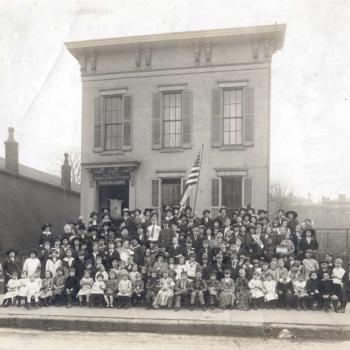Don't be fooled: the Googles and Microsofts of the world may claim to be multinational corporations. They make good products and yield dollars for shareholders. But they have nowhere near the complexity of the Catholic Church's 1 billion-plus members, spread out with thousands and thousands of parishes, hospitals, schools, retreat houses, orphanages, refugee services, religious orders, and so on, speaking any number of languages. What will drive tomorrow's Catholic mystics to participation in the institution of the Church (and its accompanying bureaucracy, the Vatican) is the recognition that real solidarity among the peoples of the earth will require a serious commitment to Jesus' command to love the neighbor -- that is, to actually build structures of mutual support from places like Manila to Montevideo to Montreal to Mogadishu.
Of the two, the second movement is harder for the contemporary mind to digest. We think mysticism is kind of sexy -- it's about trying to be deeply serious people on very serious quests for truth and spiritual fulfillment. But if those quests are to end in something more than a rather bourgeois self-satisfaction, they must run the route of confronting the hard realities of a world whose history is often sad and whose present reality is often hard to swallow.
The questions that Catholics of the future will face are these: am I content to shape my life around the desires generated by the culture around me, or am I willing to shape my life around the Beatitudes? Will I make life choices about relationships, about money, about power in imitation of people most like me, or out of a conscious attempt to promote justice, especially for the most disenfranchised of the world? Am I willing to risk my life on the words of Jesus, even when I have much more to lose than do the millions of poor with whom I approach the table of the Eucharist? Who, in the end, is my neighbor?
Tomorrow's Catholic Church will be a communion of mystics who see their task as rooted in the incredible command of Jesus to love the neighbor: the Muslim neighbor, the atheist neighbor, the corporate neighbor, the hungry neighbor, the sexually abused neighbor, the African neighbor, the scientific neighbor, the female neighbor, the gay neighbor, the violent neighbor, maybe even eventually the extraterrestrial neighbor. I consider myself a Catholic evangelist precisely because I hope others will see the astonishing opportunity in such a mission.
Tim Muldoon is a Catholic theologian, writer, and spiritual director. He is the author of five books, including most recently Longing to Love, and the editor of two anthologies. He has taught for some fifteen years at Catholic colleges and universities, in the areas of the history of Western thought, theology and spirituality, scripture and ethics. Currently, he teaches in the Honors Program at Boston College, where he also serves in the Office of University Mission and Ministry. Tim is a member of the Patheos Expert Community.





